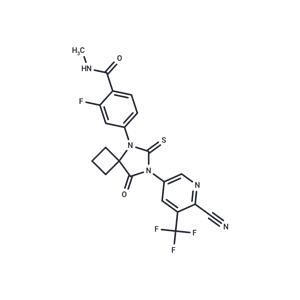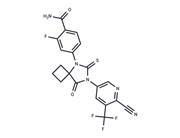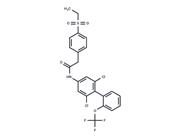| Name | Apalutamide |
| Description | Apalutamide (ARN-509) is a small molecule androgen receptor (AR) antagonist with potential antineoplastic activity. |
| Cell Research | Cells are incubated for 48 hours, after which ARN-509 is added in a 16 μL volume to the RPMI culture medium. For the antagonist mode assay, the ARN-509 is diluted in culture medium also containing 30 pM R1881. After 7 days' incubation, 16 μL of CellTiter-Glo Luminescent Cell Viability Assay is added and Relative Luminescence Units (RLUs) measured.(Only for Reference) |
| Kinase Assay | Competitor assay kits (green) are used to determine relative in vitro binding affinities of ARN-509 for the rat AR ligand binding domain (LBD), human progesterone receptor (PR) LBD, and full-length human estrogen receptor-alpha (ERα) and human glucocorticoid receptor (GR). Each hormone dose is performed in triplicate, relative error is calculated from the standard error of the mean (SEM), and binding curves are fit using a single binding site competition model (Prism statistical analysis software package) with R2>0.8. Experiments are conducted multiple times with SEM<0.3 log units from the average logIC50 value. Ki values are calculated as averages across experiments with SEM, and binding affinities are reported as a percentage relative to the tight-binding ligand control for that receptor[1]. |
| In vitro | Administering 10 mg/kg of ARN-509 orally daily inhibits cell proliferation in the prostate tissue of adult male dogs. In castrated male immunodeficient mice with LNCaP/AR-luc xenograft tumors, ARN-509 (10 mg/kg/day, orally) suppresses tumor growth, decreases the proliferation index, and increases apoptosis rates. This compound demonstrates a dose-dependent inhibition of tumor growth in castrated male immunodeficient mice carrying LNCaP/AR-luc xenograft tumors. A 28-day administration of ARN-509 at 10 mg/kg/day results in a lack of glandular secretory activity and a 1.7-fold reduction in epididymal weight in adult male dogs, associated with a threefold decrease in prostate weight. In patients with metastatic CRPC, ARN-509 induces a sustained decline in PSA levels within the 30 to 300 mg range. ARN-509 exhibits strong anticancer activity in castrated anti-prostate cancer mouse models, inducing prolonged symptom relief after treatment completion. It is safe and well-tolerated in 24 patients with metastatic CRPC who have undergone prior treatments, with peak plasma levels appearing 2 to 3 hours post-administration. |
| In vivo | At a concentration of 10 μM, ARN-509 disrupts the nuclear localization of AR in LNCaP cells expressing AR-EYFP, resulting in a decreased concentration of AR available for binding to androgen response elements (ARE) in cells expressing AR-EYFP. ARN-509 also inhibits R1881-induced transcription mediated by VP16-AR fusion protein in Hep-G2 cells expressing VP16-AR fusion protein and an ARE-driven luciferase reporter, with an IC50 value of 0.2 μM. Furthermore, ARN-509 (at concentrations <10 μM) suppresses the androgen-mediated induction or repression of mRNA expression levels of 13 endogenous genes (including PSA and TMPRSS2) in the LNCaP/AR prostate cancer cell line. Moreover, in the LNCaP/AR prostate cancer cell line, ARN-509 (<10 μM) inhibits the proliferative effects of R1881 (30 pM). At the concentration of 10 μM, ARN-509 effectively competes with 1 nM R1881, thereby preventing AR from binding to promoter regions. |
| Storage | Powder: -20°C for 3 years | In solvent: -80°C for 1 year | Shipping with blue ice. |
| Solubility Information | DMSO : 50 mg/mL (104.73 mM)
H2O : < 1 mg/mL (insoluble or slightly soluble)
Ethanol : 5 mg/mL (10.47 mM)
|
| Keywords | Inhibitor | Apalutamide | Androgen Receptor | inhibit | ARN 509 | ARN509 |
| Inhibitors Related | Valproic acid sodium salt | Dehydroisoandrosterone 3-acetate | Penicillin G sodium salt | S-23 | Halothane | Valproic Acid | Chlorothymol | Riluzole | Allura Red AC | Sunset Yellow FCF | (-)-α-Pinene | Flutamide |
| Related Compound Libraries | Pain-Related Compound Library | Bioactive Compound Library | Anti-Neurodegenerative Disease Compound Library | EMA Approved Drug Library | Anti-Cancer Clinical Compound Library | Drug Repurposing Compound Library | Inhibitor Library | Bioactive Compounds Library Max | Ion Channel Targeted Library | Anti-Cancer Active Compound Library |

 United States
United States



